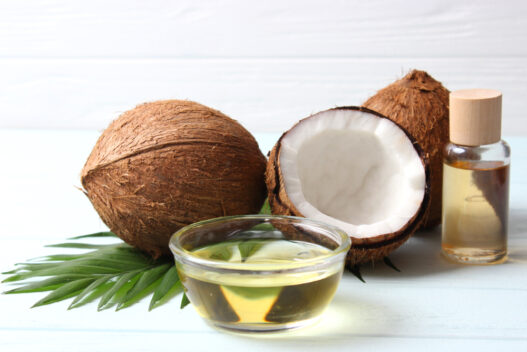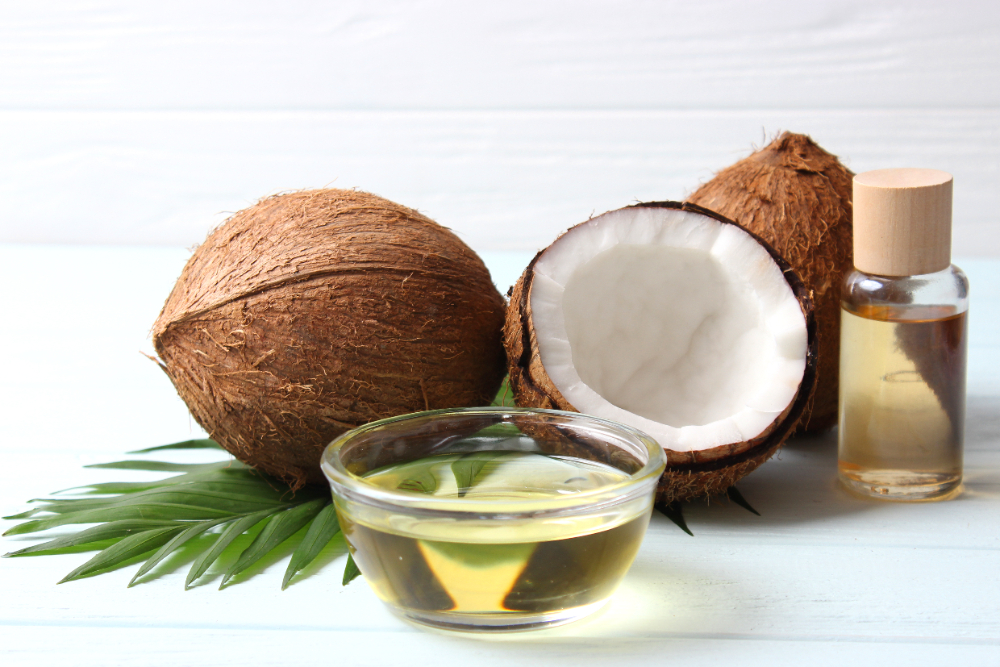While there is no effective remedy for quick weight loss except for rigorous dietary restrictions that can take a toll on your health, here is some good news for those who quickly wish to burn fat and calories without going on rigorous exercise or dietary regimes. A magic wand for weight loss you may call it and proven and backed by efficient science – it’s MCT oil. How to use MCT oil for weight loss and belly fat loss? Know the difference between MCT oil vs. Coconut oil. Know several other MCT oil benefits other than weight loss including its role in reducing insulin resistance.
The MCT in MCT oil means medium chained triglycerides which are present in high percentages in coconut oil and palm kernel oil. Other than that, dairy products such as butter and cheese are also rich sources of MCT. The MCTs are composed of Caprylic acid (octanoic acid: 65–75%), Capric acid (decanoic acid: 25–35%), Caproic acid (hexanoic acid: 1–2%) and Lauric acid (dodecanoic acid: 1–2%).
Here, we describe how to use MCT oil for weight loss and belly fat loss and how MCT oil vs. coconut oil compare. In addition, we have listed numerous health benefits of MCT oil including its effects on insulin resistance.
MCT Oil for Weight Loss
A study conducted by the College of Physicians and Surgeons, Columbia University, and New York Obesity Research Centre, New York St. Luke’s Roosevelt Hospital showed that consumption of medium-chain triacylglycerol oil leads to a greater rate of weight and fat mass loss than olive oil (1).
Not just this study but scientists have reported evidence from several such studies where the replacement of long-chain triglycerides (LCTs) with MCTs in the diet or MCT oil has led to significant reductions in weight loss, reduced abdominal or belly fat with no adverse effect on lipid profiles which means that these fats are healthy.
A meta-analysis of 13 studies showed that MCTs reduce body weight, waist and hip circumference, and total fat including visceral fat (2). Thus, switching from an LCT to an MCT diet is beneficial for weight loss. There is a clear difference between how the two types are digested. While MCTs are directly transported to the liver where they are converted into energy, LCTs require an additional step involving the lymphatic system. Thus, if they are not converted quickly into energy, they are stored as fat. The latter does not happen with MCTs.
So, how does MCT oil promote weight loss and belly fat loss?
- Studies have shown that MCT oil consumption increases energy expenditure resulting in less body weight gain and reduced fat deposition, particularly belly fat therefore MCT oil could be used in the treatment or prevention of human obesity
- MCT oil prior to exercise results in increased fat burning due to greater resting energy expenditure.
- Research has shown that MCT oil consumption reduces food intake and enhances satiety which helps in weight loss and belly fat loss (3).
MCT oil induces ketosis and weight loss
Taking MCT in the diet through MCT oil can also be a shortcut to induce ketosis and can be part of a keto diet for weight loss and belly fat loss. Generally, fasting or carbohydrate-restricted diets are known to induce ketosis that aid in weight loss or belly fat loss.
The classical ketogenic diet consists of a mixture of long-chain triglyceride (LCT) fats with a small amount of MCT fats. Often, it is practically difficult to follow a keto diet that severely restricts carbohydrates. MCT oil has only MCT fats and can help maintain ketosis more easily. It means that one needs to consume less total fat and can allow more carbs and proteins and thus easy to follow by anyone yet achieving ketosis. Thus, MCT oil-based diet is relatively easy to follow than the classical keto diet.
MCT oil as an energy booster
MCT oil can be used as a quick source of energy as it enters the cells quickly with a lower likelihood of getting stored as body fat. It enhances exercise performance and has also been used by athletes as fuel. Within minutes, MCT is oxidized in the muscle.
MCTs in MCT oil do not require pancreatic enzymes to be digested. They can be absorbed directly through the gut into the bloodstream and to the liver and can be a quick energy source with small amounts of carbs.
Ketones produced by MCT fat can cross the blood-brain barrier and can act as brain fuel as well. Thus, MCT oil has shown benefits in neurodegenerative diseases when studied with some evidence for Alzheimer’s disease as also described below.

Other MCT oil benefits
Not only for weight loss and belly fat loss but there are several other MCT oil benefits including reducing metabolic syndrome, inflammation, liver diseases, and enhancing exercise performance (4). This means that their overall beneficial effects on health if incorporated into the diet can be a boon for those trying to lose weight. In diabetics, MCT oil improves glycemic control and reduces insulin resistance. In a scientific study, increasing dietary MCT consumption resulted in lowered blood glucose levels and reduced insulin resistance (5).
Saturated fats can be classified into short-chain, medium-chain, and long-chain fatty acids. The saturated fats that are generally considered to be unhealthy contain long-chain fatty acids. There are studies to prove that long-term use of saturated fats, in the form of MCT, does not have adverse effects on the heart rather they have several beneficial effects. Due to their effects on reducing lipid levels, they have been considered good for the prevention of cardiovascular diseases.
One advantage of MCT oil is that it can be easily and rapidly absorbed into the bloodstream unlike other fats and therefore they have beneficial effects on several gastrointestinal disorders. Other MCT oil benefits include good antibacterial and antifungal effects of MCTs.
MCTs of MCT oil are also good for the brain and have been used in the prevention and treatment of neurological diseases such as Epilepsy. Not only that but there are also studies showing MCT oil benefits in the prevention of neurodegenerative diseases such as Alzheimer’s disease.
MCT oil side effects
Common gastrointestinal MCT side effects include abdominal pain, nausea, diarrhoea, and vomiting.
Interestingly, MCT oil side effects were reported in a recent study (6) where researchers demonstrated one drawback with one of the components of the MCT i.e. caprylic acid (octanoic acid) that it might affect your bones adversely. The researchers showed that when octanoic acid, when given to experimental mice for 4 weeks, resulted in deleterious effects on their bones though significant weight reduction took place.
It should be noted that this study used a single component of MCT oil. The study also showed that when octanoic acid was combined with decanoic acid, another component of MCT oil, the negative effects were nullified. Therefore, MCT oil as a whole may not have adverse effects on bone. However, this requires further investigation. Anyone with a pre-existing bone disease must be careful while taking the same and must consult their physician.
Coconut oil vs MCT oil – Which is better for weight loss?
Coconut oil has also been promoted for weight loss. Many people consider coconut oil and MCT oil as similar but that is not the case. Coconut oil has an MCT content of about 54%. However, it also contains 42% lauric acid, long-chain triglycerides (LCTs). While MCT is purely 100% MCT and does not contain LCT. Thus, with MCT oil, consumers can avoid lauric acid which can slow down the metabolism.
In a study comparing the effects of Coconut oil vs MCT oil on food intake, it was observed by researchers that coconut oil had less satiating properties than MCT oil and that coconut oil was also slightly less palatable (7) and hence cannot be promoted for weight loss in a way MCT can be. Several other studies also compared MCT oil vs coconut oil for weight loss and reported that coconut oil was not as effective in weight loss and as a saturated fat must be consumed in moderation.
Studies have also compared the beneficial effects of MCT oil vs Coconut oil and concluded that the MCT oil benefits cannot be generalized to coconut oil as coconut oil increases bad cholesterol (low-density lipoproteins) while MCT does not.
Moreover, as MCT oil contains 100% MCTs (caprylic and capric acid), so one does not need to consume large quantities as they would have to if they derived MCTs from coconut or palm kernel oil for achieving the same benefits.
How to use MCT oil for weight loss, belly fat loss and other benefits?
Commercially available and over-the-counter MCT supplements are manufactured by several nutritional companies and several organic varieties, in the form of oils and/or powders. Some of these are also available through popular websites such as Amazon or iHerb etc. However, official websites are better like buying Dr. Gundry Mct Wellness from its official store.
These supplements are easily available and can be taken on the advice of your physician or nutritionist.
You may use MCT oil either in your ‘bulletproof coffee’, as a salad dressing, or can be used for cooking. It can be added to any fruit drink or smoothies. Its fat-burning effects can boost metabolism and burn more calories throughout the day.

References
- https://pubmed.ncbi.nlm.nih.gov/18326600
- https://pubmed.ncbi.nlm.nih.gov/25636220/
- https://academic.oup.com/jn/article/132/3/329/4687297
- https://www.ncbi.nlm.nih.gov/pmc/articles/PMC5805166
- https://www.nature.com/articles/s41598-017-14376-y
- https://www.ncbi.nlm.nih.gov/pmc/articles/PMC7997977
- https://pubmed.ncbi.nlm.nih.gov/28689741











